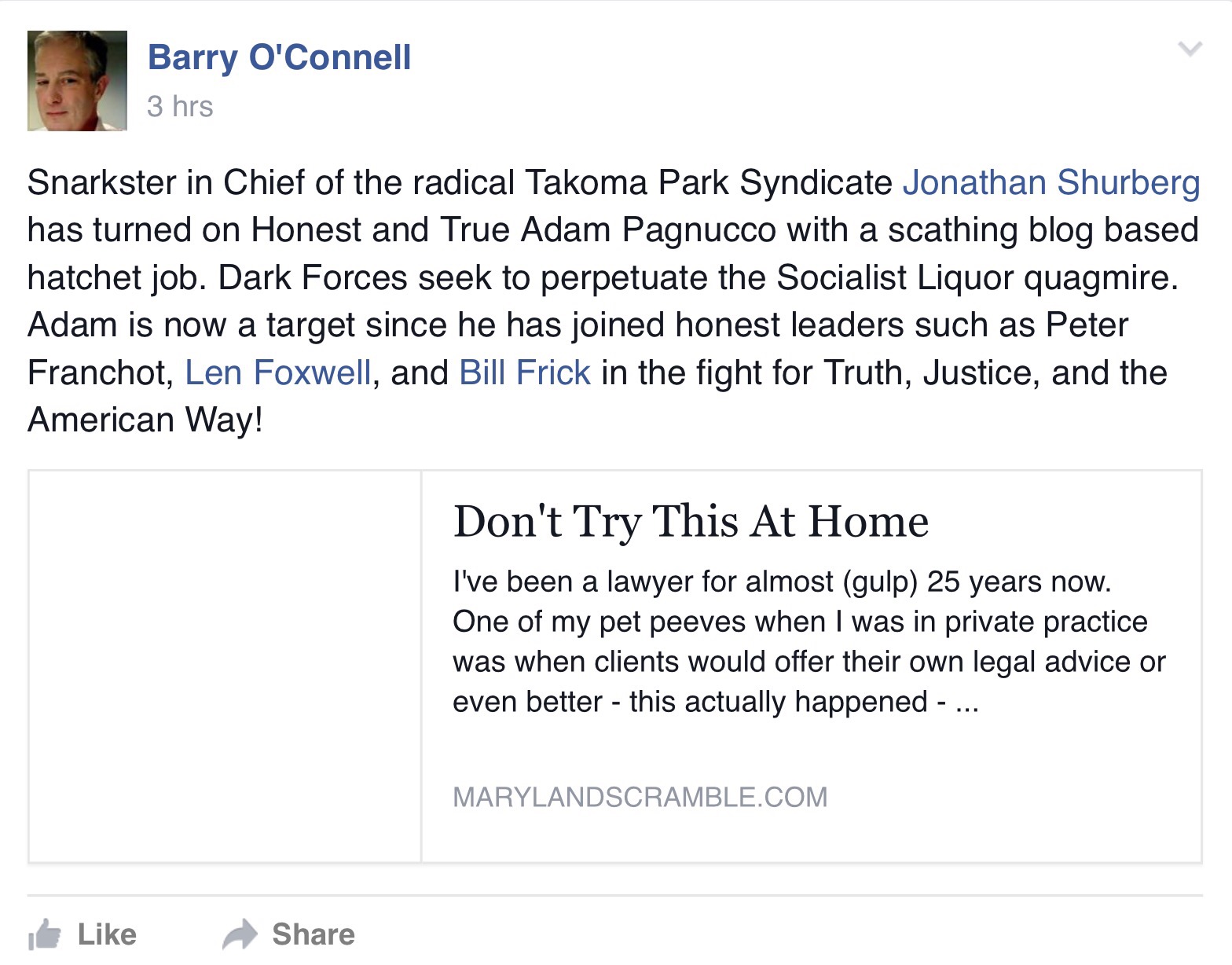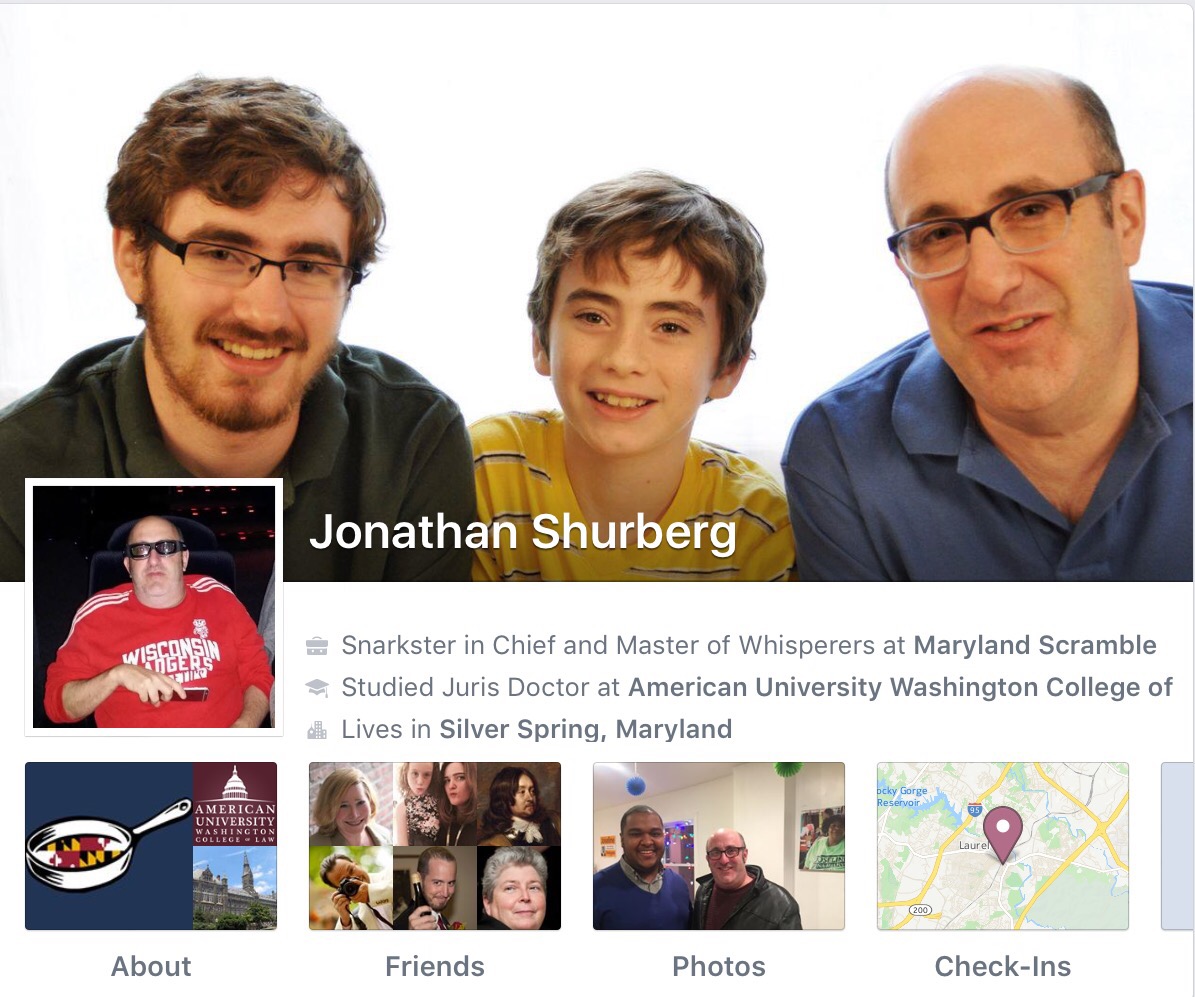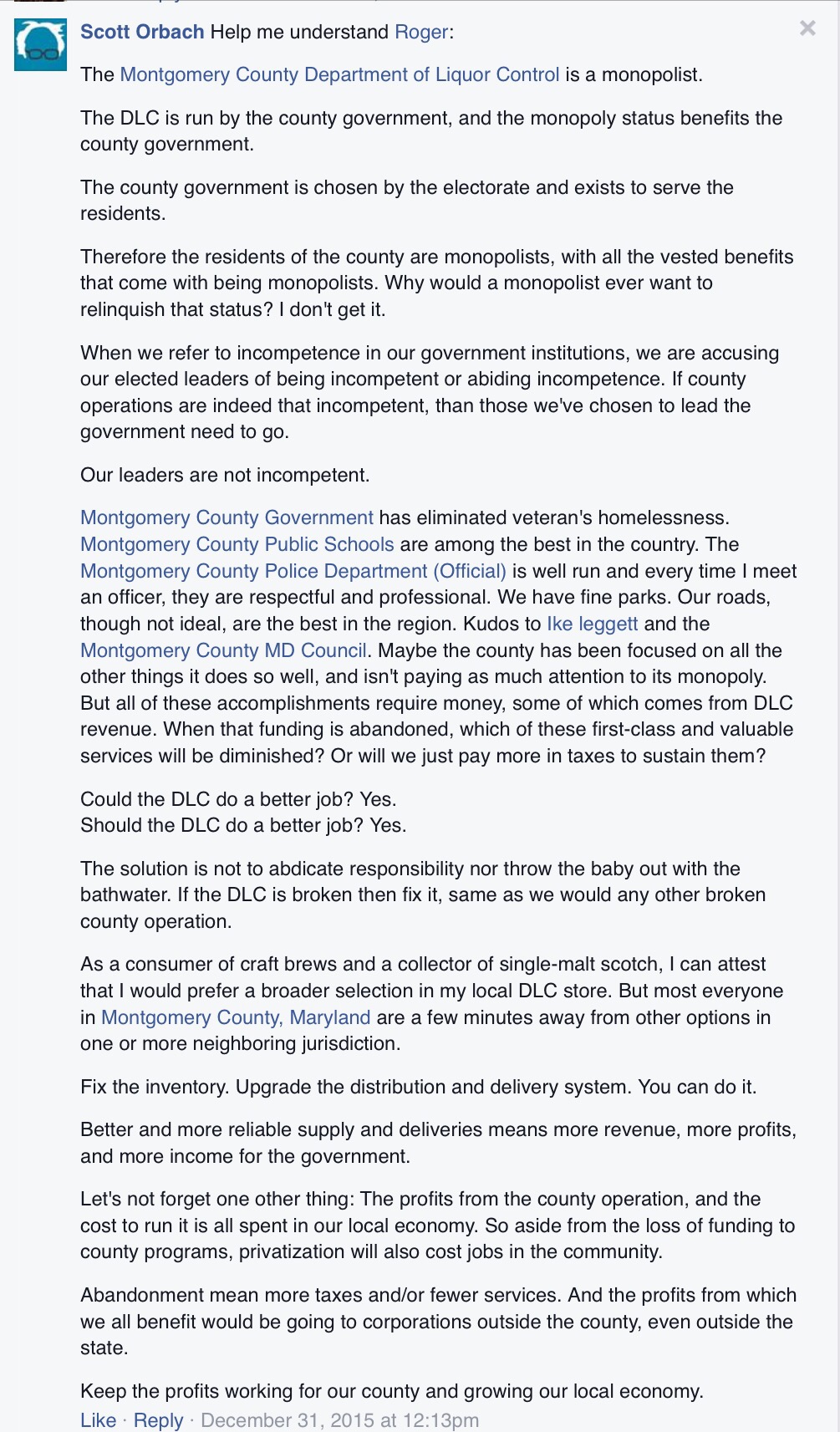I’ve been a lawyer for almost (gulp) 25 years now. One of my pet peeves when I was in private practice was when clients would offer their own legal advice or even better - this actually happened - advice from their bartender. Which opened up a whole host of other issues, but that’s a different story.
Law is the only profession where people who have no legal training at all feel free to tell attorneys how to do their job. I don’t know precisely why this happens but it seems to be unique to the legal profession. Can you imagine telling your surgeon “hey, listen, I had a friend who had a situation JUST LIKE THIS ONE, so I really think you should consider doing the surgery a different way”? I’ve heard some variation on that request as a lawyer hundreds of times.
I was reminded of this peeve when I read David Lublin’s post about a letter Adam Pagnucco wrote to Montgomery County Attorney Marc Hansen. Adam decided to try to play lawyer - and government professor Lublin decided to title the post “County (Ab)using Liquor Stores for Political Speech.” He’s wrong, and so is Adam. The County is well within its right to speak on the issue, as I will make abundantly clear.
First, the letter. The County is putting out a flyer defending the current alcohol distribution system to customers at its stores. Adam is upset with this, calling it “political speech” as opposed to what he considers to be more legitimate “commercial speech.”
Hello, Mr. Hansen. This is Adam Pagnucco. I am working with a group of folks who are advocating for Delegate Bill Frick’s legislation to allow competition in the county’s alcohol industry.
I am in receipt of the attached flyer which I understand is being distributed in county liquor stores. The flyer is unquestionably a political communication and not a commercial advertisement.
As you know, the state’s Court of Special Appeals has ruled that the county “may speak to advance its existing policies and programs, to advocate for policy changes, and to advocate against policy changes.” http://www.mdcourts.gov/opinions/cosa/2015/0175s14.pdf However, during the Question B campaign of 2012, the county ran ads for its point of view on Ride On buses and denied the Fraternal Order of Police the same opportunity. ACLU of Maryland protested that and the county decided to allow FOP ads, but it was too late in the campaign for the ads to appear. The ACLU wrote, “When the government privileges one side of a political debate in a forum open to private speakers, as Montgomery County is doing here, it engages in viewpoint discrimination clearly prohibited by the First Amendment.” http://www.aclu-md.org/press_room/82
As the County Attorney, here is my question to you. If the county is using its facilities to distribute political speech, as it did with the Ride On buses, can county citizens with a different point of view use those same facilities to also distribute political speech? In other words, can we request that our flyers be distributed along with the county’s flyers?
Adam Pagnucco
Side note: Adam acknowledges in his letter that he is “working with a group of folks who are advocating for Delegate Bill Frick’s legislation to allow competition in the county’s alcohol industry.” Given the number of posts that David Lublin has handed over to Adam on this issue, this offhand disclosure is one that should have been made a long time ago.
Adam has fundamentally mischaracterized the holding of the case he cites, and he ignores the court’s discussion of a series of Supreme Court and other federal cases that actually answer his question directly - in the negative. Leaving the question open - was this an honest inquiry or a publicity stunt? Read on and decide for yourself.
First off the language Adam recites is by no means the actual holding of the case. He maintains that there is a distinction between impermissible “political speech” by the County and permissible government speech. That distinction was rejected by the Court of Special Appeals in the opinion he recites. The second paragraph of the opinion makes this clear:
We hold that the County acted within its powers and not illegally by spending County funds to campaign in favor of the particular ballot issue; and that Leggett and Lacefield did not violate any laws. Accordingly, we shall reverse the judgment of the circuit court.
In its conclusion on the issue of government speech, the Court wrote:
The County used its website, email newsletter, Ride-On buses, public libraries and recreation centers, and vehicles to promote a message: voting to uphold Bill 18-11’s limits on effects bargaining for MCPD officers is good County governance policy. The County communicated to potential voters its view that effects bargaining was detrimental to the County’s efficient and productive management of its police force, and on that basis advocated in favor of Question B. As in Kidwell, the County’s speech was directly related to its governance, was in an area in which it had expertise, and concerned an issue about which the voters were entitled to hear its perspective in deciding how to vote. The County was engaged in government speech.
This is so even though Bill 18-11 had not gone into effect at the time the County engaged in the campaign. As noted, Bill 18-11 was passed during the 2011 County legislative session by unanimous vote and was signed into law by Leggett. A government may speak to advance its existing policies and programs, to advocate for policy changes, and to advocate against policy changes. See Kidwell, supra; Page, supra. As the Page Court emphasized, the check on government speech is that the individuals elected to office whose views the government is then espousing may be voted out of office. See also Sutliffe v. Epping School District, 584 F.3d 314, 331 n.9 (1st Cir. 2009) (“If the voters do not like those in governance or their government speech, they may vote them out of office”). Like the school board in Page, which was comprised of elected board members, the County was led by Leggett, an elected official. OPI is the mouthpiece of the County Executive’s office and Lacefield is a political appointee. If County voters disagreed with the County’s message on Question B or if they disagreed more generally with the County’s choice to engage in a political campaign, they were free to vote out of office those they deemed responsible.
It really couldn’t be more clear. The County is free to spend money on espousing its views on a ballot question, and voters are free to vote the responsible officials out of office.
So what about Adam’s question: must the County allow the use of its facilities to its opponents? The answer, legally speaking, is no. Which is equally clear from the Court of Special Appeals’ discussion of several Supreme Court and other federal cases.
Let’s look first at a 2005 Supreme Court case called Johanns. Here’s how the Maryland court described the case.
That case was a challenge to the Beef Promotion and Research Act of 1985 (“the Beef Act”), in which Congress announced a federal policy of promoting beef products and funded that promotion through an assessment on cattle sales and importation. Two associations whose members paid the assessment sued, arguing, inter alia, that the Beef Act violated their First Amendment rights by compelling them to subsidize speech they found objectionable. The Supreme Court rejected that argument, opining:
- Our compelled-subsidy cases have consistently respected the principle that “[c]ompelled support of a private association is fundamentally different from compelled support of government.” “Compelled support of government”—even those programs of government one does not approve—is of course perfectly constitutional, as every taxpayer must attest. And some government programs involve, or entirely consist of, advocating a position. “The government, as a general rule, may support valid programs and policies by taxes or other exactions binding on protesting parties. Within this broader principle it seems inevitable that funds raised by the government will be spent for speech and other expression to advocate and defend its own policies.” We have generally assumed, though not yet squarely held, that compelled funding of government speech does not alone raise First Amendment concerns.
Id. (citations omitted). The Court held that the Beef Act did not violate the association members’ First Amendment rights.
Two subsequent federal cases are also instructive. The first was a 2006 decision by the Sixth Circuit called Kidwell. Again, from the Maryland opinion cited by Adam Pagnucco.
The city council was using public funds to support a “Vote No” campaign on an issue referred to the voters — whether to overturn a city council resolution establishing a fire department for the city. The city charter expressly authorized expenditures by the city council to inform voters about election issues affecting the municipality, so long as the issues did not involve the election of particular candidates. The taxpayers filed suit, alleging that the city’s use of public funds to advocate (not merely give information about) its position on a ballot issue amounted to compelled speech, in violation of their First and Fourteenth Amendment rights.
Noting that government speech in the context of an election presents “unique constitutional issues,” the Sixth Circuit, in a split decision, held that First Amendment concerns did not justify a “bright-line rule barring such speech, at least where the government speaks within the scope of its governance functions.” Id. at 625 (footnote omitted). It opined:
- Governments must serve their citizens in myriad ways, including by provision of emergency services, and these activities require funding through taxation. [The city council’s] speech related to emergency service and tax initiatives thus fits squarely within its competence as governor and was made in the context of “advocat[ing] and defend[ing] its own policies.” The issues on which the city advocated were thus germane to the mechanics of its function, and are clearly distinguishable from the hypothetical cases of government speech in support of particular candidates suggested by the dissent. . . . .
- In this case, Ohio’s home rule system made [the city’s] policies subject to acceptance or rejection by ballot. In this context, a limit on government speech during elections would allow hecklers to silence the government on issues in which it has an interest and expertise-and on which citizens have an interest in hearing their government’s perspective. See Ala. Libertarian Party v. City of Birmingham, 694 F. Supp. 814, 817 (N.D. Ala.1988) (upholding promotional campaign relating to levies where the subject of the campaign was “related to the common needs of all citizens”). Because [the city’s] speech in this case was germane to its role as governor, plaintiffs have failed to show that democratic legitimacy is threatened or that [the city’s] compelled subsidy of its speech violates the Constitution.
- The natural outcome of government speech is that some constituents will be displeased by the stance their government has taken. Displeasure does not necessarily equal unconstitutional compulsion, however, and in most cases the electoral process-not First Amendment litigation-is the appropriate recourse for such displeasure. See Johanns, 544 U.S. at 563, 125 S.Ct. 2055 (noting the importance of political accountability of decisionmakers). The needs of effective governance command that the bar limiting government speech be high. The plaintiffs in this case have failed to show that the [city’s] expenditures crossed the line separating a valid compelled subsidy from an unconstitutional one, and valid advocacy from prescription of orthodoxy.
The last case is the most relevant, both because it is from the 4th Circuit (of which Maryland is a part) and because it actually answers Adam’s question directly. It’s a 2008 case called Page.
In Page v. Lexington County School District One, 531 F.3d 275, 277 (4th Cir. 2008), the Fourth Circuit reached the same result in a case challenging a South Carolina school district’s use of its website, email, and “other forms of communication” to oppose a bill pending before the state legislature that would grant tax credits to families who home- schooled their children or enrolled them in private school. The school district, which was a “body politic and corporate” under South Carolina law, took the position that the proposed law would undermine the public education system. Id. A citizen who supported the proposed law demanded equal access to the school district’s “‘informational distribution system’” to advocate in favor of the measure. Id. When the school district refused his request, he filed suit, alleging that the school district was engaging in unconstitutional viewpoint discrimination in violation of the First Amendment. The district court granted summary judgment in favor of the school district.
The Fourth Circuit affirmed. Citing Johanns, it opined that it is “well-understood” that “[e]ven though government is supported by the taxes of all, its policies are not supported by all. It follows therefore that the government may advocate in support of its policies with speech that is not supported by all.” Id. at 280. The court emphasized that the government is “‘accountable to the electorate’” for its speech. Id. at 281 (quoting Bd. of Regents of Univ. of Wisconsin Sys. v. Southworth, 529 U.S. 217, 235 (2000)). As relevant here, the plaintiff citizen also argued that “as a general matter . . . the government speech doctrine should . . . never apply when the government attempts to influence legislation.” Id. at 287. He maintained that advocacy of that type is unique because it is not “checked by the ‘ballot box.’” Id. The Fourth Circuit disagreed. Citing Kidwell, it noted that the school board members were elected and were subject to removal in the next election “if the voters disagree[d] with the manner in which they have exercised their discretion.” Id.
Seems pretty clear, huh? So back to my question - was this an honest inquiry or a publicity stunt? Maybe we should ask Adam’s bartender. I bet he has an opinion on the subject. Everyone else seems to have one.


